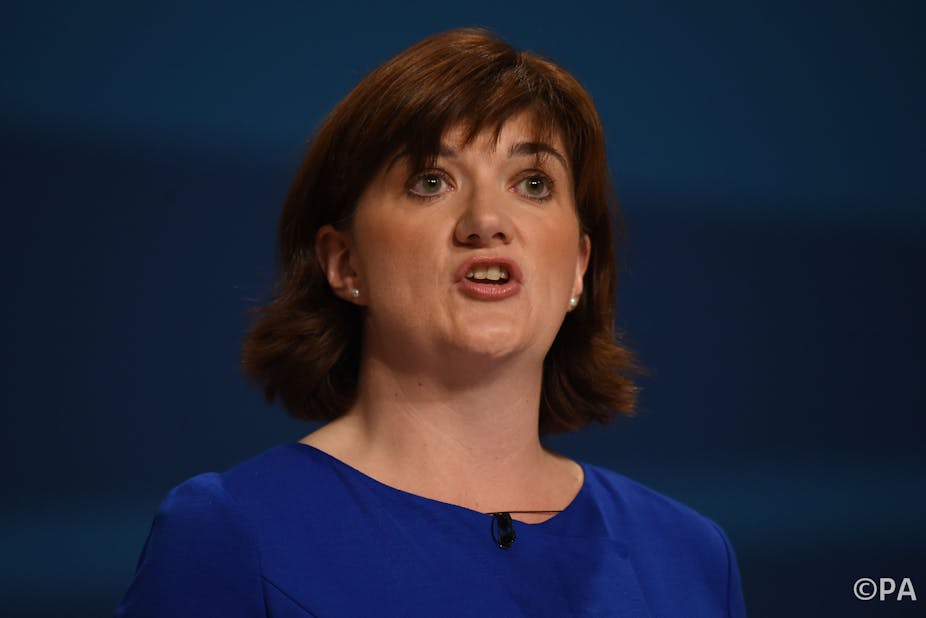The longest and most enthusiastic applause during Nicky Morgan’s first conference speech as secretary of state for education was for her predecessor Michael Gove. This seemed apt for a pre-election effort that was largely about continuity and lauding the work of the government over the past four-and-a-half years.
There was of course the inevitable attack on shadow education minister Tristram Hunt’s short speech at last week’s Labour conference. Overall she was there to champion the widely held view in the Conservative party – that education has been one of their biggest success stories.
The themes were reform and achievement, with Morgan clearly rejecting calls for a slower pace of reform and pointing to improved standards, more discipline and a greater emphasis on traditional subjects. There was also a strong emphasis on a more rigorous and business-led vocational offering through the tightening of the vocational qualification structure and the foundation of University Technical Colleges. “Standards, back, discipline, restored, expectations, high. An old culture of can’t replaced with a new culture of can.” So far, so Govian.
Changes of tone, not substance
But there were some minor changes of tone compared to the combative manner of her predecessor. Morgan went out of her way to praise the work of teachers and classroom assistants, stating that: “If our school story has a hero, it is … the teacher you see every day at the school gate.”
The general nature of this praise, as opposed to the often very specific naming of individual teacher-bloggers by Gove, was noteworthy. Morgan also put greater emphasis on the need for education to focus on broader outcomes than just the academic, highlighting an aim to “develop character, resilience and grit” and preparedness for life in young people. There was also an announcement of future efforts to more actively combat homophobic bullying.
In view of research showing that collaboration can lead to school improvement Morgan’s emphasis on the value of partnership and collaboration between and within schools was welcome. There is growing evidence of the value of moving towards a “coopetitive” education system in which competition and co-operation co-exist.
Few new policy initiatives
But what was notably lacking in the speech were any major new policies. Morgan restated a recent announcement of funding for innovative ideas to promote character building. She then announced the foundation of a further 35 free schools, and made a welcome pledge to reduce burdens on teachers and assure they spend more time teaching in the classroom.
But the latter promise remains very much in the exploratory stages:
“I wish I could announce some great initiative today that would solve this problem at a stroke. I can’t do that. But I will work with the profession over the coming months to find solutions.”
This is not surprising, as any solution is likely to have to touch on reform of the school accountability and inspection system which drives a lot of the paperwork that teachers spend so much of their time on. Recent attacks on Ofsted by Conservatively minded educators and think-tanks such as Policy Exchange form an interesting backdrop in this regard.
Vagueness also surrounded other plans for the future, such as improving work experience by getting businesses to work more closely with schools and getting more women into science, technology, engineering and maths subjects. Laudable aims, but there was a distinct lack of detail on how to achieve them.
The tension between freedom and control
The speech also did nothing to address an inherent tension in Conservative education policy – that between freedom and control. The continued expansion of free schools and academies with their freedom to shape curricula, policies and practices, suggests we are moving towards a system built to provide parents with a choice between a range of competing models and visions of education and pedagogy.
Meanwhile, the emphasis on “proper subjects” (in the words of the conference introducer, Cambridge candidate MP Chamali Fernando), inculcation of “British Values” and strengthened discipline point to a desire for a common, traditional approach.
Ultimately, this is a hard circle to square, and the hollowing out of the middle tier of local accountability makes it even more so. Innovation in free schools, for example, will mean that not all will cleave to the “traditional curriculum” advocated by Morgan, even if experimentation to date has mainly been in areas such as extended school days.
This need not be a problem, provided standards and access for all are maintained through rigorous monitoring, but this does contradict some of the stated aims of the Conservatives’ current policy. Sooner or later this contradiction will have to be resolved.

